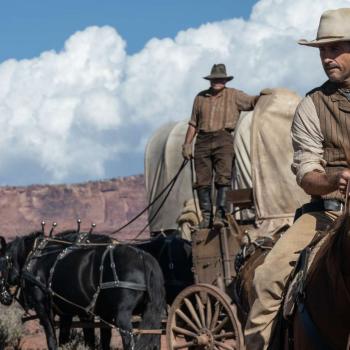In the new documentary, “God Bless Bitcoin,” currently streaming on YouTube and X (formerly Twitter), the question is asked “How do we fix our broken money?” Directors and financial experts Brian and Kelly Estes, inspired by the book “Thank God for Bitcoin,” use the film format to make the case for digital currency through talking head interviews with Mark Cuban, Tony Hawk and Cathie Wood as well as animated lessons on what is happening with global currency now. The Estes believe in their message so strongly that, as a last-minute decision, they put the film out for free, hoping to help consumers who have been feeling the financial squeeze.

Brian, CIO of Off the Chain Capital, and Kelly, founder and president of the Great Big Beautiful Tomorrow Foundation, recently spoke to Reel Faith’s DeWayne Hamby about the inspiration for the documentary, a deep spiritual component to the money system, and why it is so important to speak about now.
At what point did you decide a documentary is the way to go? “We want to educate people and maybe a documentary is a way to do it.”
Brian Estes: Four years ago, I read a book called “Thank God for Bitcoin,” which is about the Christian view of our monetary system and how Bitcoin fits in. And it just made me curious. I was like, “Well, this is the Christian view. What do the other religions say?” I dove in and did my research on the Muslim and the Jewish and Hindu and Buddhist aspects of it. And then I just kind of sat on it, but then I had this like internal voice, like talking to me, “You should take what you learned and tell people about it.” I’m a storyteller. I’ve never written a book, never made a movie, and so I just kind of ignored it. But then the voice kept getting louder and louder and louder. And then finally, two years ago, I went to Kelly, who has her master’s degree in education, and I said, “Hey, you know, I feel this need to tell this story. I kind of want to make a movie out of this. Can you help me tell the story?” And so I dragged her into it and she helped me take what was up here and in my heart and lay it out.
Kelly Estes: I do believe Bitcoin has is a tool for people to create a store of value for themselves. And for the last 15 years of my life and education, I’ve worked with people, with students who have grown up in generational poverty, and I see that the struggles they are having with our current financial system, and how it doesn’t matter how many jobs they work, they can’t keep up. And I think that financial literacy is key. I think this movie has partly a discussion of financial literacy and partly a discussion of how Bitcoin is a new tool that people could use, all looked at through the lens of morality and ethics. So, to me, I was like, I can get on board with that 100%
I think it’s a great point you make in the film about how in the Brady Bunch show, this whole family survived on one salary, even though it’s fictional. But a one salary home used to be more common. Also, I’m curious about you said you read the book about Bitcoin from the Christian perspective. At what point did you decide that this documentary would benefit all these other viewpoints?
Brian Estes: To circle back to what you said about the Brady Bunch. Why are people having fewer children? One of the reasons is because they can’t afford it. And they can’t afford it because their money doesn’t hold hold its value. And it’s the same reason that 50% of kids, 18 to 30, are still living with their parents. And in Genesis, it says “Man shall leave his parents find a wife, Be fruitful and multiply and fill the earth.” And because of our monetary system not being functional anymore, it’s preventing young people from leaving their parents, finding a spouse, having many children, and fulfilling God’s will.
That’s a good point, because there is a new phenomenon of the prolonging of adolescence. That contributes to the whole thing of an 18 year old 30 years ago who are much different than an 18 or even 25 year old today, as far as their responsibilities and what they’re doing with their lives.
Kelly Estes: The reason that we wanted to explore the other faiths, both of us said, the funny thing about this is that Bitcoin is open source. It’s for everybody, but we’re only looking at it through the lens of Christianity. What would happen if we open that up to other faiths and see what those have to say about this more moral form of money? Because of that, we started exploring what they said, and what we found is something that was new to Brian and me, honestly, was that Islam and Judaism and Christianity, those are all the Abrahamic God and so the Old Testament for all of us is the same. Now we go about interpreting it differently, right? But really, we are united in those mandates from God in the Old Testament. And so I think that was really what prompted us to look further and then say, if we want more people to know about this, let’s look at it from all of the different faith traditions?
Brian Estes: Yeah, I grew up in a small town in Illinois, 10,000 people, and yet, Protestants and Catholics, we had one Mormon family in town, but we didn’t have any Jewish families or Muslim families in town. So, I just never knew anything about those faiths and that’s why I was curious. So, for example, in the Muslim faith, I learned this when we were doing the research. It’s against the Muslim faith to pay interest or receive interest. That’s called “riba.” They could use gold, because gold doesn’t create interest or interest, but our current monetary system, it’s based off paying interest and receiving interest. So there are 2 billion Muslims out there where the current financial system is not compliant with their religion. There was a Saudi cleric several months ago that put out what’s called a Fatah, that said Bitcoin is Sharia compliant money, and it could be used in the Muslim faith as money. Just like gold, it could be used in the Muslim faith. We just wanted to, you know, explore these different religions just to see how they fit into, you know. Is Bitcoin good for them? Or is it just certain faiths it’s good for? And what we found out is that all across the spectrum, Bitcoin is good for all the faiths.
What’s the next step after somebody watches the documentary and they’re compelled to act. What would you hope somebody would do after watching it?
Kelly Estes: I would hope that this just opened the door to their understanding. We give a macro view of Bitcoin and what it does. We really spend more time talking about why it’s useful to people and why it’s a more ethical form of money, but I would encourage them to before they do anything to learn more, study more. And there is a website called hope.com that has a ton of really important information, easy to digest. Some others, more complicated articles and information. It’s got a full university of resources for people to study more.
Brian Estes: The goal is, like Kelly said, you know, just this hopefully piques their interest, gets people curious. It takes 20 to 40 hours of study to understand, you know, the full gamut of what Bitcoin could do to help human, you know, and help the world. So, this is hopefully open the door to allow people to do that, like take that first step into, you know, educating themselves. And like Kelly said, hope.com is a website that Michael Saylor bought 30 years ago, and he’s dedicated that site to Bitcoin education, you know, to help educate the world. And he and he does it for free. You know, there’s a whole university section in there to help people understand, you know, how this technology can make the world better.
I noticed household names like Tony Hawk and Mark Cuban in the documentary. How did they get involved?
Kelly Estes: Our filmmaker reached out to their team, and they agreed to be interviewed for the film. They are Bitcoiners, or they understand Bitcoin enough and believe in aspects of it enough to be able to they agreed to be interviewed for us, but neither of us know them personally.
Brian Estes: Tony got involved very early on in Bitcoin, probably about 10 years ago. And Mark Cuban, at first, he was skeptical about it, and then a few years ago, he finally understood it, and now he’s like a proponent of people should understand what Bitcoin is, because it could help them.
What’s the rollout for this?
Brian Estes: We decided just a few weeks ago, so we sent our team scrambling, to make the movie free, because we believe that the people that need to understand this information the most are the people who don’t have an extra $10 to buy a movie or rent a movie. We decided that this would be our gift back to the Bitcoin community and to help educate people. It’s on YouTube and Twitter and Amazon Prime, and then eventually it’ll be on like Tubi and Roku and Apple, and it’ll be on all the platforms. All we’re asking the price of admission is that if you like the movie and you think it should be spread to help other people understand it, then all the ask is that you share it. That’s all we’re asking is if you agree with the message, share the movie. If you don’t agree with it, don’t share it. But you know that that’s the price of admission. Is the ask button, and
Kelly Estes: As an educator, of course, I believe knowledge is power. As cliche as that might be, this is an educational film. We wanted to reach as many people as possible. Our goal is 1 billion views, and so we have dubbed it in seven languages and subtitled it in over 15 to make it more universal. People can hear it in their own native tongue, or read it in their native tongue. We really do want to push this out to as many people as possible.
Watch “God Bless Bitcoin,” directed by Brian and Kelly Estes and starring Anthony Pompliano, Cathie D. Wood, Cory Klippsten, Dan Held, David Bailey, Dennis Porter, Dr. Darrell Bock, Fr. Robert Sirico, Hailey Lennon, Harris Irfan, Jeff Booth, John Salley, Mark Cuban, Mark Moss, Mark Yusko, Matthew Roszak, Michael Saylor, Natalie Brunell, Nic Carter,Peter Diamandis, Perianne Boring, Preston Pysh, Rabbi Daniel Lapin, Rabbi Michael Caras, Robert Breedlove, Robert Kennedy Jr, Robert Kiyosaki, Sam Callahan, Scott Snibbe, Stephan Livera, Thomas Lee, Tim Draper, Vikram Rangala, Warren Davidson, at this link.
















